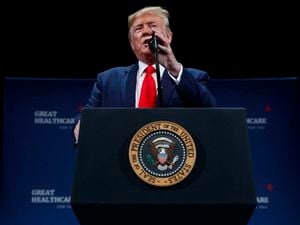Trump accuses Democrats of wanting to ‘obliterate’ US health insurance scheme
The US president portrayed himself as Medicare’s defender and signed an executive order to expand its private insurance option.

President Donald Trump has accused Democrats of an attempt to “totally obliterate” the United States’ health insurance programme Medicare.
Mr Trump portrayed himself as the scheme’s defender as he took steps to expand Medicare’s private insurance option.
But no Democrat is proposing to take coverage or benefits away, a fact that undercuts Mr Trump’s rhetoric, and he did not dwell on his own budget proposals for cuts in Medicare payments to hospitals and other providers.
Mr Trump spoke at The Villages, a community for adults in Central Florida, as he angrily defended himself against the impeachment inquiry by Democrats in the House of Representatives. That part of the state overwhelmingly supported Mr Trump in the 2016 presidential election.
Healthcare has emerged as a central issue for Democrats competing for their party’s 2020 presidential nomination. Much of the debate has centred on senator Bernie Sanders’ Medicare for All plan, which would cover everyone under a government-run plan and eliminate most private insurance.
Mr Trump said: “Medicare is under threat like never before. Almost every major Democrat in Washington has backed a massive government healthcare takeover that would totally obliterate Medicare.”
Mr Sanders says his plan would lower costs and provide new benefits, including coverage for long-term care.
Mr Trump signed an executive order directing his administration to pursue changes to Medicare, which covers about 60 million seniors and disabled people. Much of what he wants to do is geared toward enhancing Medicare Advantage, the private insurance option picked by about one-third of seniors.
Medicare Advantage plans offer savings on premiums and an annual limit on out-of-pocket costs. These plans provide one-stop shopping, eliminating the need for separate supplemental insurance. Offered by major insurers, the plans also cover prescription drugs in most cases.
But there are trade-offs. People joining a Medicare Advantage plan generally must accept limits on their choice of hospitals and doctors as well as prior insurer approval for certain procedures. If they change their minds and decide to return to traditional Medicare, they are not always guaranteed supplemental “Medigap” coverage, which is also private.
Among the other priorities are an expansion of telemedicine and changes to avoid overpaying for procedures just because they get done in a hospital instead of a doctor’s office.
Health and human services secretary Alex Azar said Mr Trump’s order directs his department to examine whether its current policies and practices put traditional Medicare ahead of the private Medicare Advantage option. Some advocates for older people say that it is the other way around and that the administration is trying to put private plans ahead.
The executive order does not involve a major overhaul of Medicare, which would require congressional approval.
So far the debate about Medicare for All has mainly been about its projected costs to the government, estimated at 30 trillion dollars to 40 trillion dollars over 10 years.
The Sanders plan would eliminate most private health insurance, including the Medicare Advantage option. Mr Sanders, who unexpectedly underwent a heart procedure this week, says Medicare for All would nonetheless offer seniors broader benefits and lower costs.
